The Professional Regulatory Board of Geology which operates under the Professional Regulation Commission of the Phillippines has recognised that reciprocity exists between geoscience bodies in Australia and the Philippines.
Accordingly, Australian geoscientists are now able to take the Philippines geologist licensure examination.
The recognition of reciprocity between the two countries follows efforts by Scott Robson, an Australian geologist resident in the Philippines to be allowed to take the licensure examination. Mr Robson has a BSc from Monash University and his professional standing in Australia was supported by letters provided by both AIG and AusIMM. The Professional Regulatory Board of Geology recognised that Mr Robson’s degree was equivalent to a bachelor’s degree from a Philippines university and that reciprocity on the practice of geology exists between the two countries.
The ruling is seen as establishing the opportunity for other Australian geologists to undertake the Philippines geologist licensure examination in the future.
The latest instalment in the Australian geoscientist employment survey series, looking at the September quarter (Juy to September) of 2018, is open for contributions until next Saturday (27 October). Please take two or three minutes to contribute to the survey this week if you haven’t already done so.
This survey, available here, will provide data on trends in geoscientist employment in Australia during the third quarter (July to October) of 2018. In the June quarter, the Australian geoscientists unemployment rate fell to 8.5%. This was the lowest level of unemployment seen in several years and the survey results indicated that some long term unemployed geoscientists were returning to work.

Every state, except Queensland, experienced a decrease in unemployment during the June quarter. The unemployment rate in Queensland increased from 11.3% at the end of March to 12.2% at the end of June. In Western Australia, unemployment fell from 9.4% to 7.9%. In South Australia, the unemployment rate fell from 11.1% to 10.3%.
The period covered by this survey is typically one of the busiest times in the Australian exploration field season, which will make the results of this survey especially interesting.
The survey takes only two or three minutes to complete. You do not need to be an AIG member to contribute. No data that could personally identify respondents is collected. Contributions to the survey are required from both employed and unemployed geoscientists to ensure the relevance of results. Your completing the survey really helps to make a difference to the standing and knowledge of our profession.
The survey will be open for contributions until 27th October. Every contribution adds to the reliability of the survey results.
Council met 3rd October 2018. The following note is a summary of the key points discussed at the meeting for the information of members, intended to promote transparent management of Institute affairs and member engagement. These notes have been approved by Council but are not a substitute for the meeting minutes.
A number of members remain unfinancial for the 2018-2019 financial year. This isn’t unusual for this time of year. Reminder notices have been sent by email. Unfinancial members have been ineligible to exercise benefits of AIG membership, including acting as a Competent Person in compliance with the JORC Code since 30 September 2018. Members who remain unfinancial at 31 December 2018 may be required to reapply for membership. You can check whether you are currently financial using the member search facility on the AIG web site.
Council approved a revised Registered Professional Geoscientist application review process proposed by the AIG Registration Board.
AIG Student Bursary recipients for 2018 have been selected and were approved by Council. All bursary applicants will be advised of the status of their applications (successful or unsuccessful) prior to the list of recipients for 2018 being announced.
Work has commenced on a series of short, focussed JORC Code training modules for both geoscientists and other “end-users” of public exploration results, mineral resources and ore reserves reports. Pilot courses will be run in Townsville early in 2019. A course explaining the role of the JORC Code and Competent Persons for early career geoscientists is also in development. Council discussed a micro-accreditation module under which multiple, short, linked training courses can be completed towards satisfying a training objective, rather than requiring course participants to enrol in a single, long training course. The longer-term objective is to have courses available for delivery, face to face, across Australia or on-line. The subjects of these courses will also be expanded to cover practical skills required by early career geoscientists with time. Member involvement in this process will be welcome.
A proposal for establishment of a Nominations Committee, to help ensure Council has the requisite skills to manage and further develop the Institute, was considered.
Council accepted Michael Edward’s resignation as Chair of AIG’s Ethics and Standards Committee, with an expression of sincere thanks to Michael for his work in this important role over a number of years. Jacqui Coombes has agreed to replace Michael in this role. An announcement of Jacqui’s appointment will be made shortly.
James Llorca tendered his resignation from Council. A process to fill the casual vacancy created by James’s resignation was initiated. Council sincerely thanked James for his work in the management and development of the Institute.
Stuart Masters resigned as an AIG representative on the JORC Committee. A process to select a new representative was initiated.
Proposed changes to AIG’s Constitution and Code of Ethics, intended to improve the fairness of AIG’s Complaints and Ethics and Standards processes were received from Ashurst, a leading, Australian, national law firm. The proposed changes are currently being prepared for consideration and endorsement by members at an Extraordinary General Meeting, probably in early 2019.
A revised Privacy Policy, developed for AIG by Ashurst, was approved by Council and published on the AIG web site.
Council discussed the potential benefits of engaging a Chief Executive Officer to increase public representation of AIG members’ interests on professional and community issues.
Council approved AIG joining the Digital Object Identifier consortium to enable DOIs to be added to AIG publications, making them easier to search for, locate and reference, and potentially making AIG publications a more attractive platform for authors.
Andrew Waltho met with Edumine during October. The meeting discussed how AIG members could become involved in developing training materials for delivery, globally, using Edumine’s platform and receive remuneration for their work. The dialogue with Edumine is ongoing.
AGCC2018 will be held in Adelaide during Earth Science Week (14-19 October). After AGCC2018, the focus will shift to AEGC2019 to be held in Perth during 2-5 September 2019. AEGC2019, being convened jointly by ASEG, PESA and AIG, will build on the success of AEGC2018 in Sydney last February.
Any of the topics discussed in this summary may be discussed with any Council member. Contact details appear at the back of each issue of AIG News.The next Council meeting will be held 14 November, 2018. Papers for the meeting, including branch and committee reports, should be submitted by 24 October.
Andrew Waltho
Greg Corbett and Stuart Hayward are presenting their informative and well regarded epithermal Au-Ag and porphyry Cu-Au exploration short course in Sydney this December.
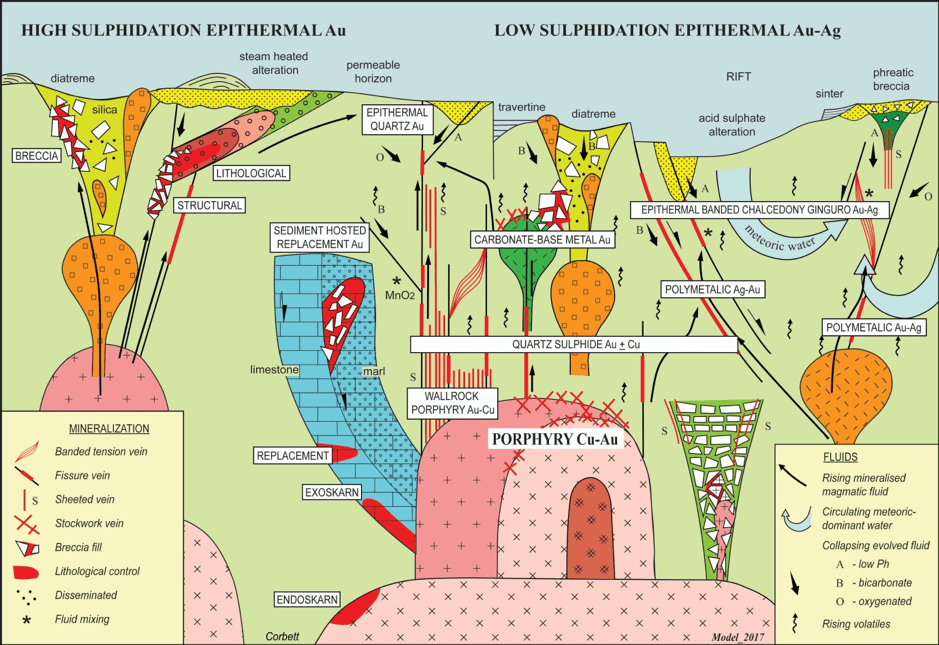
Two days of PowerPoint lectures (December 4 and 5) focus upon mineral exploration for epithermal and porphyry ore deposits derived from Dr Corbett’s 40 years field experience, including earlier short courses provided with the late Terry Leach from the early 1990’s. Exploration and mining examples from over 40 countries are used to delineate the characteristics of different epithermal and porphyry ore types, and controls to mineralisation, using tools such as alteration, structure and breccias. The exploration implications are considered throughout and a final section considers geological features recognised in exploration marginal to ore bodies. Participants will be provided with a current draft to the new short course notes. Drafts of the first few chapters are available here. The lectures will be held at the York Club, 99 York St Sydney, with lunch, morning and afternoon teas provided.
A practical exercise will be held W B Clarke Geoscience Centre, Londonderry December 6, using selected diamond drill core referred to in the lectures and a set of teaching specimens to provide hands on training in ore and alteration mineralogy and the use of geological models. It will be run by Corbett and Stuart Hayward, who has over 30 years experience in epithermal-porphyry ore deposit exploration and mining. A return bus from the city and lunch provided.
Prices include lunch, morning and afternoon teas and transport to and from Londonderry.
Minimum of 20 participants required and limited to a maximum of 40. For registration details visit www.corbettgeology.com/services/

Emeritus Professor Kurt Lambeck AO from the Australian National University was awarded the 2018 Prime Minister’s Prize for Science at a ceremony in Canberra this week.
The award recognises Professor Lambeck’s 50-year contribution to Australian and global geodesy that underpins the GPS technology on which we rely for accurate navigation and enables more accurate guidance of satellites and space missions, helps track changes in sea levels over time, and facilitates detailed understanding of the deep structure of Earth.
During his career, Professor Lambeck has held leadership roles at universities in France and the US and has won a number of international awards from Sweden, Japan, France, Norway, the US and the Netherlands.
Professor Lambeck joined the Research School of Earth Sciences at ANU in 1977. He is currently President of the Australian Academy of Science and a member of the Antarctic Ecosystem and Environment CRC.
He was elected to the Australian Academy of Science in 1984 and to the Royal Society in 1994. He is a foreign member of the Royal Netherlands Academy of Arts and Sciences (1993), Norwegian Academy of Science and Letters (1994), Academia Europaea (1999),the Académie des Sciences, Institut de France (2005), and the US National Academy of Sciences (2009). He has received a number of international prizes and awards including the Tage Erlander Prize from the Swedish Research Council (2001), the Prix George Lemaître from the Université catholique de Louvain (2001), and the Eminent Scientist Award from the Japan Society for the Promotion of Science (2004).
He has published two books and more than 250 papers on subjects in geophysics, geology, geodesy, space science, celestial mechanics, environmental geoscience, and glaciology.
AIG congratulates Professor Lambeck on his prestigious award which recognizes his contribution to Earth sciences throughout his distinguished career.

Perth will host the 2nd Australasian Exploration Geoscience Conference (AEGC) from Monday 2 to Thursday 5 September 2019 at Crown Perth.
The AEGC is the largest petroleum and mineral geoscience conference in Australasia, and incorporates the West Australian Basin Symposium (WABS) and the ASEG-PESA International Geophysical Conference and Exhibition.
The event will be jointly hosted by the Australian Institute of Geoscientists (AIG), Australian Society of Exploration Geophysicists (ASEG), and Petroleum Exploration Society of Australia (PESA).
The theme for the 2019 conference is “Data to Discovery”. The AEGC technical program committee has a focus on Geology, Geophysics, and Geochemistry and how these are applied in exploration for both Petroleum and Mineral systems in Australasia and the wider Asia-Pacific region. The conference has major sub-themes encompassing but not limited to:
A vital component of the 2019 conference will be the inclusion of dedicated streams for Australian basins, discovery techniques, mineral mapping, and remote sensing applications.
On behalf of the AEGC 2019 Organising Committee, we look forward to welcoming you to Perth. Visit the conference web site for the latest information regarding the conference, accommodation, sponsorship and exhibition opportunities.
John Gorter and Tim Dean
Co-Chairs
Call for Abstracts Expression of Interest Closes: 31 January 2019 – submit your expression of interest now via the AEGC2019 website.
Early Bird Registration Opens: 1 March 2019
Call for Extended Abstracts Closes: 22 March 2019
Author Notification: 3 May 2019 or before
Registration Deadline: 31 May 2019

The Geocentric Datum of Australia 2020 (GDA2020) is a geocentric (earth-centred) coordinate reference system that is Australia’s new official national datum. GDA2020 will eventually supersede the GDA94 datum and older coordinate systems, such as Australian Geodetic Datum 1966 and 1984 (AGD66 and AGD84).
It is a ‘plate-fixed’ datum that is aligned with the 2014 realisation of the International Terrestrial Reference Frame (or ITRF2014). The “earth-fixed” ITRF is typically not regarded as a “datum” — rather it is the international standard reference framework to which national geocentric datums are aligned.
GDA2020 coordinates differ from GDA94 coordinates by approximately 1.5 to 1.8 metres and are more closely aligned with the reference frameworks used by modern GNSS – such as GPS, GLONASS, Galileo and BeiDou.
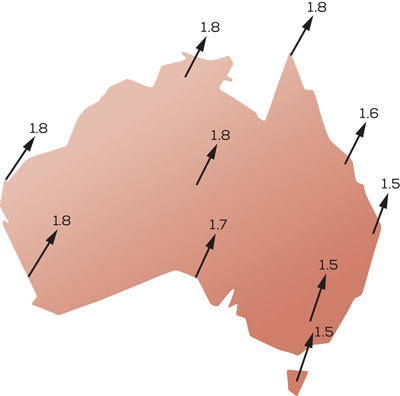
The standard map projection associated with GDA2020 is the Map Grid of Australia 2020 (MGA2020), a transverse Mercator projection that conforms to the internationally standardised Universal Transverse Mercator Grid system.
The changes are needed because national and global location information systems operate differently, and they are diverging. Australia’s national grid of latitude and longitude coordinates moves with the drift of the continent, like a giant net tied to known reference points on the landscape. Together, these reference points and latitude and longitude coordinates are known as a geodetic datum. Every country has its own datum, and the official Australian geodetic datum since 2000 has been the Geocentric Datum of Australia 1994, or GDA94. The coordinates of features on our maps, such as roads, buildings and property boundaries, are all based on GDA94, and they do not change over time.
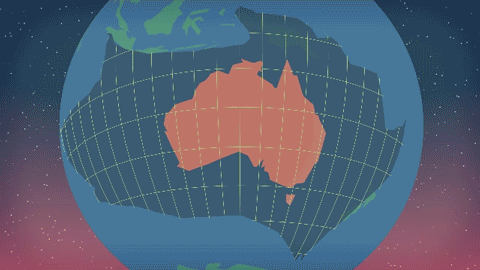
There have been significant technology developments recently that provide ready access to accurate positioning systems. It is anticipated that the Global Navigation Satellite System (GNSS) will be capable of providing positioning services with centimetre accuracy in real-time to the mass market on mobile devices. Given that data from GNSS is referenced to a global reference frame, specifically the International Terrestrial Reference Frame 2014 (ITRF2014), it is appropriate that the Australian datum is closely aligned to the same global reference frame.
There are a number of useful references available on-line from Geoscience Australia and the Intergovernmental Committee on Surveying and Mapping. A search for GDA2020 will reveal a list of useful resources, including a series of informative fact sheets.
If you are in Brisbane, 30 October, the ASEG Queensland Branch meeting will feature a talk by Matt Higgins, Manager of Geodesy and Positioning in the Queensland Department of Natural Resources, Mines and Energy on the new datum.

This survey, available here, will provide data on trends in geoscientist employment in Australia during the third quarter (July to October) of 2018. In the June quarter, the Australian geoscientists unemployment rate fell to 8.5%.
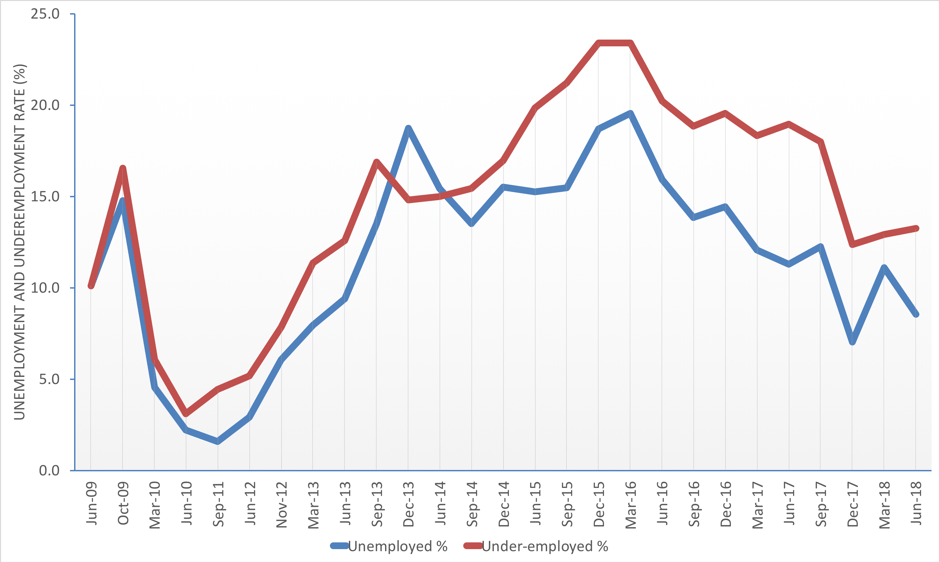
This was the lowest level of unemployment seen in several years and the survey results indicated that some long term unemployed geoscientists were returning to work.
Every state, except Queensland, experienced a decrease in unemployment during the June quarter. The unemployment rate in Queensland increased from 11.3% at the end of March to 12.2% at the end of June. In Western Australia, unemployment fell from 9.4% to 7.9%. In South Australia, the unemployment rate fell from 11.1% to 10.3%.
The period covered by this survey is typically one of the busiest times in the Australian exploration field season, which will make the results of this survey especially interesting.
The survey takes only two or three minutes to complete. You do not need to be an AIG member to contribute. No data that could personally identify respondents is collected. Contributions to the survey are required from both employed and unemployed geoscientists to ensure the relevance of results. Your completing the survey really helps to make a difference to the standing and knowledge of our profession.
The survey will be open for contributions until 26th October. Every contribution adds to the reliability of the survey results.
Thanks in advance for your support

The American Geosciences Institute (AGI) and Geoscience Australia have launched a new website for AusGeoRef, a bibliographic database for Australian geoscience literature since the mid-19th century.
Publications in AusGeoRef cover Australian geology back to 1840, the date at which GeoRef began covering Australia. Geoscience Australia began supplying references for AusGeoRef in 2003 and will continue to expand the database to include as many current Australian publications as possible.
The new website features expanded functionality, including a geographic search view option, as well as the abilities to set up individual accounts and to easily save and share lists of references.
Launched in 2003 as a cooperative arrangement between AGI and Geoscience Australia, AusGeoRef now includes references to a growing database of more than 200,000 journal articles, books, maps, conference papers, reports, and theses. Explore these references now through the new and improved AusGeoRef website.
Geoscience Australia’s acting Chief Science Information Officer Tanya Whiteway said Geoscience Australia is proud to have been a partner with AGI on AusGeoRef for the past 15 years, contributing more than 35,000 records of new Australian geoscience publications to the database in that time.
“Our own scientists use both AusGeoRef and GeoRef regularly to locate references not included in any other earth sciences databases. We believe the new features being announced today will make AusGeoRef even more essential to searchers of Australian literature in the geosciences,” Whiteway said.
Want to use AusGeoRef but don’t want to pay a subscription? Day passes are now available for select GeoRef databases, including AusGeoRef.
About GeoRef
The GeoRef database, established by the American Geosciences Institute in 1966, provides access to the geoscience literature of the world. GeoRef is the most comprehensive database in the geosciences and continues to grow by more than 100,000 references a year. The database contains over 4 million references to geoscience journal articles, books, maps, conference papers, reports and theses.
About Geoscience Australia
Geoscience Australia (GA) is Australia’s pre-eminent public sector geoscience organisation. The work of Geoscience Australia addresses a diverse range of issues across key strategic priorities including Australia’s mineral and energy resources, natural hazards, water resources, marine jurisdictions, and fundamental geographic information. GA is also custodian and champion of the nation’s geosciences knowledge base and capabilities enabling evidence-based decisions and policy development by government, industry and the Australian community. It is based in Canberra, Australian Capital Territory.
About AGI
The American Geosciences Institute (AGI) is a nonprofit federation of 52 scientific and professional associations that represents more than a quarter-million geoscientists. Founded in 1948, AGI provides geoscientists with access to scholarly information, serves as a voice of shared interests in the profession, plays a major role in strengthening geoscience education, and strives to increase public awareness of the vital role the geosciences play in society’s use of resources, resiliency to natural hazards, and health of the environment.
AGI is a not-for-profit 501(c)(3) organisation dedicated to serving the geoscience community and addressing the needs of society. AGI headquarters are in Alexandria, Virginia. AIG is an American Geosciences Institute affiliate.
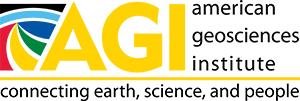
AIG’s Privacy Policy has been updated. The updated policy was developed by AIG’s lawyers to ensure that the approach and practices followed by your Institute conformed with the requirements of current Australian and EU regulations, and to protect the interests of members. AIG members can be assured that the Institute will, under no circumstances, provide member information to third parties for any reason, other than verification of AIG membership. AIG’s online systems have recently been audited to help ensure the security of the Institute’s membership database and other identifying information. The updated Privacy Policy follows.
Prepared 12 September, 2018
Approved by Council 3 October 2018
The Australian Institute of Geoscientists (AIG) ABN 22 002 266 659 recognises the importance of privacy protection and takes all practicable measures to ensure the privacy of any Personal Information provided to it for the conduct of AIG activities.
AIG treats personal information in accordance with the Privacy Act 1988 (Cth) (Privacy Act). This Privacy Policy explains how we handle Personal Information relating to individuals, to meet the requirements of the Privacy Act.
1. Definitions
In this Privacy Policy the expression “we“, “us” and “our” are a reference to AIG. The expressions “you” and “your” refer to each individual whose Personal Information we may handle from time to time where we are required to comply with the Privacy Act in respect of such Personal Information.
Personal Information means information or an opinion about an identified individual, or an individual who is reasonably identifiable:
Privacy Policy means this document as amended from time to time.
Sensitive Information means information or an opinion about an individual’s racial or ethnic origin, political opinions, membership of a political association, religious beliefs or affiliations, philosophical beliefs, membership of a professional or trade association, membership of a trade union, sexual orientation or practices or criminal record that is also personal information, health information, genetic information, biometric information or biometric templates.
Spam Act means the Spam Act 2003 (Cth).
2. What Information Do We Collect?
We only collect Personal Information to the extent that it is reasonably necessary for one or more of our functions or activities, which are generally described in this Privacy Policy.
The personal information we collect from you includes:
All payments made using online facilities provided by AIG are processed using a secure, external website provided by AIG’s bank. AIG itself does not handle, collect, or store any of the financial or credit card details of anyone making payments through the website and takes no responsibility for the security of that information.
3. How Do We Collect Your Personal Information?
Our preference is to collect your Personal Information directly from you, unless it is unreasonable or impractical to do so.
Information will generally be collected from the following sources:
4. Why Do We Need Your Personal Information?
AIG may use and disclose your Personal Information for the primary purpose for which we collected it, such as:
We may also use and disclose your Personal Information for other purposes permitted or required by law, including reasonably related (or directly related, for Sensitive Information) secondary purposes that are within your reasonable expectations.
If you do not provide us with the Personal Information, or you withdraw your consent for AIG to collect, use and disclose your personal information, we may be unable to provide our services to you.
5. Communication From Us
We do not use Sensitive Information for marketing purposes.
We may use and disclose your Personal Information (other than Sensitive Information) to provide you with information on:
where you have consented to us doing so. All electronic messages will identify AIG.
If at any time you no longer wish to receive direct marketing from us or do not want your information disclosed for direct marketing, you may unsubscribe using the link in each email message, using the newsletter subscription link on the AIG website home page, or by contacting us using the details below.
Please note that even if you have requested not to receive further direct marketing communications, we may nevertheless continue to provide you with information about changes to our terms and conditions for the supply of our services or activities, and other factual information as permitted under the Privacy Act and Spam Act.
6. Will We Give Your Personal Information to Anyone Else?
We will not sell, trade or transfer any of the Personal Information we collect to third parties, unless permitted or required to under the Privacy Act.
We may disclose Personal Information to third parties in the following circumstances:
Please note that AIG member’s names, membership grade, membership number and state of residence may be made publicly available through the AIG website for the sole purpose of confirming AIG membership.
7. How Do We Protect Personal Information?
The security of your personal details on the AIG website will depend on both your actions and ours. When you use the website, we require you to take specific measures to protect against unauthorised access, such as:
8. Where is Your Information Stored?
We (and our subcontractors) may hold electronic records of your Personal Information using cloud technology or other electronic means, or in paper form. These means of holding Personal Information may include offshore storage.
It is not practicable for us to specify in advance the location of every service provider with whom we deal and their locations. However, typically AIG’s website and membership database is stored in Australia. Email contact information used for the distribution of newsletters and information collected by AIG surveys is stored in the United States of America. Information collected for our “AIGeoscope” web newspaper is stored in Switzerland.
9. Access, Correction and Further Information
We will provide you with access to your Personal Information held by us unless we are permitted under the Privacy Act to refuse to provide you with such access. Please contact us via the details below if you:
There is no charge for requesting access to your Personal Information but we may require you to meet our reasonable costs in actually providing you with access.
We will use reasonable efforts to deal promptly with complaints and inquiries and, in any event, acknowledge your request within 30 days.
If you are not satisfied with how we manage your complaint, you may contact the Office of the Australian Information Commissioner at www.oaic.gov.au.
10. Changes to This Privacy Policy
AIG reserves the right to change or update this Privacy Policy at any time, without prior notice. When we do, the revised Privacy Policy will be posted on the AIG website, www.aig.org.au. The effective date of the revised policy will be recorded in the updated Privacy Policy.
You may obtain a copy of our current Privacy Policy from our website or by contacting us via the details provided in paragraph 11 (below).
11. Further Information
If you would like more information about this Privacy Policy or any other privacy related issue please contact AIG’s Executive Officer, who can be contacted using the following details:
Ms Lynn Vigar
AIG Executive Officer
PO Box 576
CROWS NEST NSW 1585
Australia
T: +61 2 9431 8662
E: exec@aig.org.au